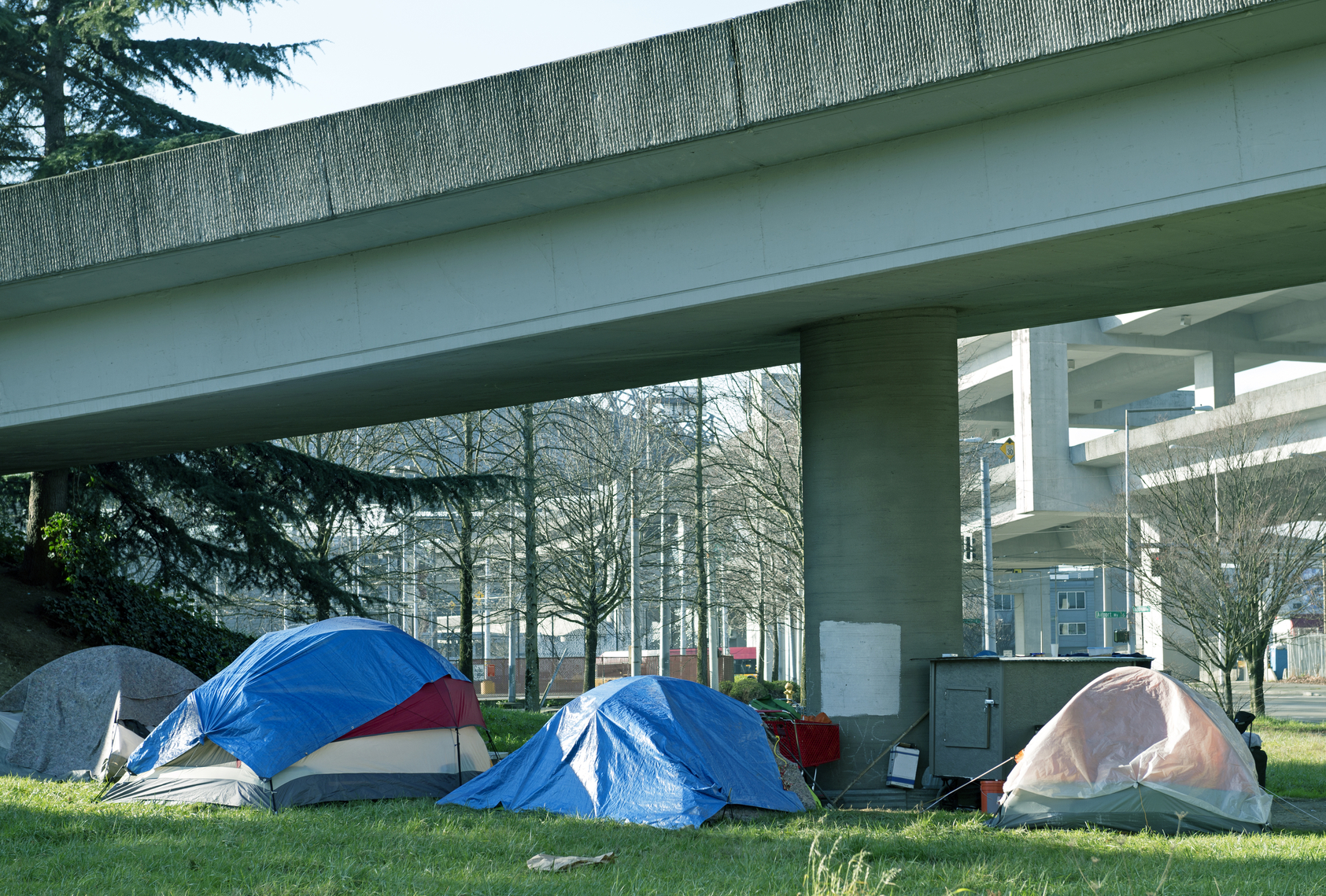
Every night an estimated 3,000 people sleep outside in Seattle. One response to this well-documented and expensive issue (the City of Seattle plans to spend a record-setting $50 million this year) came last month.
On Sept. 6, the Seattle City Council introduced legislation drafted by the American Civil Liberties Union (ACLU), Columbia Legal Services and others. Called CB 118794, it’s one of the most controversial pieces of legislation to appear before the council in years with councilmember Tim Burgess saying thousands of emails have arrived to the council from constituents.
Proponents say CB 118794 aims to reduce harm to people without homes and end homeless encampment sweeps while effectively managing and reducing encampments on city property. Others, however, take issue with a particular clause in CB 118794 that makes camping in tents or vehicles legal in suitable sites around the city for at least 30 days per location.
That clause and, to some extent, the broader legislation have fanned fears that children will be negatively impacted by people taking up temporary residence in public parks. Those questioning or against CB 118794 point to incidents like this Sept. 30 story from Interbay. “We make contact with them every day, kicking people off the field on a daily basis,” Interbay Eagle youth football coach Ron Onyon told KIRO-7 last month of an area tent camp.
In another recent incident, a man who was allegedly assaulting a woman in a tent at Woodland Park stabbed a 55-year-old man when, witnesses say, he intervened and tried to stop the assault. The suspect later turned himself in to police.
As CB 118794 undergoes revisions and before the council meets to discuss and possibly vote next week (as of publishing, that meeting is scheduled for Friday, Oct. 14), we spoke with three representatives with differing opinions on this important and complicated issue. But first, let’s get some clarity around what CB 118794 proposes.
The camping clause
The current version of CB 118794 says people won’t be allowed to camp on sports fields, playfields, Seattle Public Schools property, residential sidewalks in front of homes or on sidewalks within commercial zones during “no sitting or lying” hours between 7 a.m. and 9 p.m. If people violate these rules, they’ll be, among other potential penalties, removed by police, firefighters and first responders — whom, councilmember Sally Bagshaw says, will be prioritized to respond.
But when a place to camp is “neither unsafe nor unsuitable,” Bagshaw says campers may be allowed “to stay until outreach teams can reach them and successfully offer something better.” In such situations, the city will “provide housing before sweeps and provide 30-day notice before removing people,” notes Josh Feit of Seattle Met.
Where are these “neither unsafe nor unsuitable” camp sites? Likely they’re the unmanaged greenspaces at the edges of parks, in greenbelts and planting strips. One recent example came up in council briefing; a legislative aide said Lower Woodland by Greenlake Park and the unrestored parts of Cheasty Greenspace “might not be unsuitable,” according to Feit. More recently, a proposed Seattle Parks and Recreation map has emerged online; its origins and accuracy remain unclear as of publishing.
One view: Seattle needs this
The problems we are seeing right now are a result of policies and practices that have gone on for a few years that are making no one happy.
Ann LoGerfo, directing attorney at Columbia Legal Services who helped write CB 118794, says the proposed legislation is a way to recognize that people are already outside, that there are better places to be outside and that the end goal is still to have no one sleep outside.
“These complaints about tents and garbage or families living in cars are about the current state of affairs,” LoGerfo says. “We came up with a proposal to address the reality; it is not a way to condone what is already happening.”
She says indoor shelters and longer term housing are built into this legislation and into the budget of the city council, but there’s no magic wand that means we can get everyone indoors as quickly as we should.
“The problems we are seeing right now are a result of policies and practices that have gone on for a few years that are making no one happy,” LoGerfo says. “The legislation is about finding places where [homeless people] can be that are less intrusive and cause less conflict, with a commitment for outreach and working with these folks, until we can reach an absolute goal of housing for everyone.”
One parent's take
Mom of two Angie Gerrald is glad the city council is addressing the lack of police and civic response to incidents occurring in the city. She’s had personal experience with it.
Last summer, her family arrived on a Sunday morning at a Woodland Park picnic shelter she’d booked for a 13-year-old’s party. “Campers were sleeping in the trashed shelter space, with human excrement next to the garbage cans,” Gerrald says. She gently roused the campers and called the help number listed in the shelter, a non-emergency police line.
She says “the operator was dismissive,” telling her to look up the number for the parks department on her own. Eventually, a parks worker arrived, noting she had been cleaning a mess left by campers at the same park. When, with Gerrald, it became clear the overnight campers would not vacate the space nor obey park rules, the parks employee and Gerrard called 911 but police were unavailable to respond during the four-hour period of time her family was at the park.
“We need to offer real shelter to those who need it, but current conditions in parks and on trails are not safe,” Gerrald says. “Making tent camping [temporarily] legal in so-called suitable locations is not something I think we can safely support.”

A councilmember in opposition
City councilmember Tim Burgess opposes the proposed legislation.
“The vast majority of people who are camping in our city today actually decline services for whatever reason and I’m not being judgmental about that, it’s just a reality. After 10, 15 or 20 conversations, they still decline services,” he says. “I do not think that it is in best interest of the city for the first time ever to allow camping in public places and it certainly does not solve homelessness for even one person.”
Burgess believes it would be better to implement Pathways Home, a series of steps Seattle mayor Ed Murray proposed on Sept. 8 to create housing options, rather than tent encampments, for those who need shelter. (As an aside: Bagshaw says she supports Pathways Home and sees CB 118794 as a two-year stop gap until Pathways can be implemented.)
“I’ve been on the council for nine years,” says Burgess. “We’ve never had so many emails [about a piece of legislation] and these are not robot emails, these are individual, personal emails. People are furious and it’s not registering here. This [proposed legislation] is going to pass and it’s bizarre to me.”
What's this mean for you?
Right now, the legislation is in draft form so now’s the time to read it. Also, listen to Seattle Growth Podcast’s discussion between council member Rob Johnson (who co-sponsored the bill), and council member Burgess.
If you have an opinion on CB 118794 that you want to share, write your councilmembers at council@seattle.gov.
Citizens are also welcome at the next discussion of this legislation at the Human Services and Public Health Special Committee meeting at, most likely, City Hall; as of publishing, that meeting is scheduled for 9:30 a.m. on Friday, Oct. 14. People wanting to voice their opinion can sign up in person before the meeting. A vote on this legislation might happen at this meeting; monitor this link for updates including to location and time.











